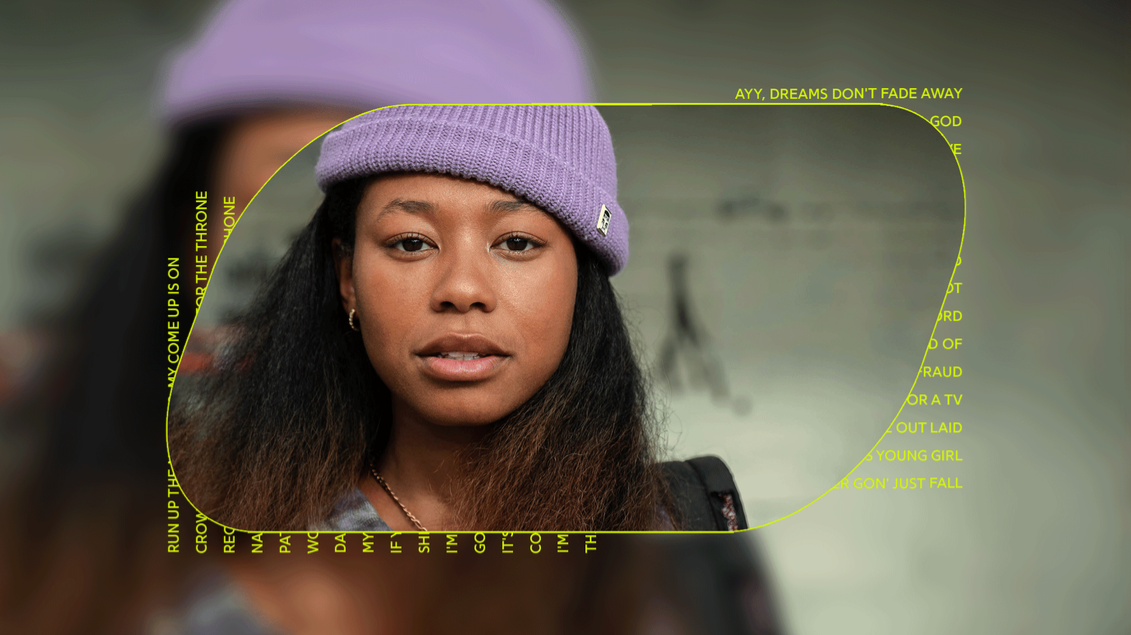How Rapsody and director Sanaa Lathan created music as powerful as the story.
Music is everything in the new Paramount+ film On the Come Up. Based on the best-selling 2019 YA novel by Angie Thomas, the PG-13 drama stars newcomer Jamila C. Gray as Brianna Jackson, a scrappy teen rapper grappling with family demons while rising through the ranks of her local hip-hop scene. Over the course of the movie, Bri is repeatedly forced to rise above her circumstances and prove herself in a series of thrilling 8 Mile-esque rap battles.
“My whole mantra with this movie was authentic,” says Emmy-nominated actress Sanaa Lathan, who makes her directorial debut with On the Come Up and plays Bri’s mother, a former heroin addict raising two children. “I wanted it to be authentic culturally—and fresh.”
Building a Dream Team
Fortunately, Lathan found the perfect collaborators to help her realize this vision. In addition to casting Gray—whose background in singing and DJing made her a natural to play Bri—Lathan tapped Grammy-nominated hip-hop veteran Rapsody and Rance Dopson and Bobby Francis—two members of the songwriting and production team 1500 or Nothin’—to serve as executive music producers on the project.
For her part, Rapsody wrote nearly all of the rhymes for the movie. That includes the razor-sharp freestyles heard during the battles and the song “On the Come Up,” the uproarious banger Bri records midway through the film after catching the ear of a hot-shot manager, played by Cliff “Method Man” Smith.

When Rapsody auditioned for the gig, she completed a homework assignment from Lathan and wrote a freestyle for one of the battle scenes in the script. Actually, Rapsody wrote three different versions of the battle, from both character perspectives, and they were all fantastic.
“She’s a genius,” Lathan says of Rapsody. “I was such a fan of hers, but I had no idea. You just never know the depth of somebody’s brilliance and commitment.”
Relating to Bri
Rapsody had good reason for being so invested in the project. About a year before the rapper signed onto the film, Angie Thomas sent her an autographed copy of On the Come Up. It turns out Rapsody was a major inspiration for the character of Bri.
“I was beyond honored,” says Rapsody. “Therefore, I naturally felt Bri’s state of mind. I see myself in her a lot, as well as a lot of other emcees that I draw inspiration from.”

Lathan also felt a deep connection to Bri. Growing up in L.A., Lathan was surrounded by addiction, and in some respects, she had to raise herself. The turning point came when she found an artistic outlet for the pain she’d been keeping inside.
“Acting was my rapping,” Lathan says. “I got into it when I was 14 at a Black theater workshop downtown. I went after school and discovered how I could pour all those emotions into my acting. It saved my life and gave me a life.”
Lathan has since built an impressive acting career that’s spanned theater to film and television. She’s appeared in such big-screen hits as Blade (1998), The Best Man (1999), Love & Basketball (2000), and Out of Time (2003), and in 2003, she nabbed a Tony nomination for her work in the Broadway play A Raisin in the Sun. Her recent turn on the HBO series Succession earned her an Emmy nomination for Outstanding Guest Actress in a Drama Series.

Perhaps not surprisingly, Gray also relates to Bri. The rising Atlanta-based actress says it was a “destiny moment” when she landed the part.
“A lot of this story talks about how Bri has to learn to be careful what she says and be true to herself in her music,” says Gray. “As an artist and as a person, I’m learning how to be true to myself when I speak to people and in the way that I present myself. I’m learning how much weight everything I do carries.”
Battle Music
During filming, Gray worked closely with Rapsody to master cadence and breath control. Rapsody even made Gray a playlist of classic hip-hop tunes featuring artists like JAY-Z, Lauryn Hill, Mobb Deep, and Ms. Jade, a Philly rapper whose 2002 debut album, Girl Interrupted, was produced almost entirely by Timbaland.
Thanks to Rapsody’s expert writing and on-set coaching, the battle scenes provide the film’s most dramatic moments. They also showcase Bri’s progression from easily flummoxed newbie to unflappable lyrical warrior.
In her disastrous first battle, Bri is thrown off her game when her adversary raps about some sensitive topics—namely Bri’s mother’s drug abuse and the untimely death of Bri’s father, a local rap legend known as Lawless. By her final battle against Infamous Millz, played by Lil Yachty, Bri has made peace with her past and immunized herself against such attacks.
“What I’ve learned through years of therapy is that when you own the darkness in your life, and you’re not running from it, that’s when you can really heal,” Lathan says. “That’s what happens with Bri. She’s like, ‘Yeah, that’s right. My mom was this. And I’m here.’”

In preparation for the epic battle against Millz that closes the film, Gray watched YouTube clips of Tori Doe, a Harlem rapper whose ferocious wordplay has made her a star of the Queen of the Ring league. Gray was especially struck by one battle where Doe shrugs off her opponent’s vicious rhymes about her mother.
“Watching that battle really helped me define the character of Bri in that moment,” says Gray. “It was a moment of release, but it’s also a moment of ownership: I’m taking my power back. Nobody can take my power away from me.”
A Controversial Anthem
If the freestyles are designed to pump viewers up and position Bri as a kind of hip-hop Rocky Balboa, the song “On the Come Up” is a little more complicated. When Bri records the single, she’s instructed by her manager to make something edgy and dangerous that might appeal to white suburban kids looking to scare their parents. Bri comes up with a song that alludes to gang violence and leads to some serious repercussions for her friends and family.
On the other hand, “On the Come Up” promotes self-empowerment. The song isn’t a complete betrayal of Bri’s values. And thanks to Rapsody’s smart lyrics and the booming production from hitmakers 1500 or Nothin’, “On the Come Up” sounds like something teens would legitimately blast out of their cars.
While writing the song, Rapsody was careful to keep some of the original words and punchlines from Thomas’s novel. Musically, “On the Come Up” is supposed to sound like an anthem. Lyrically, it underscores Bri’s witticism and command of language.
“It was important to Sanaa to create some moments for fans to see the essence of the rhymes in the book come to life,” says Rapsody. “Our job was to build on what that music sounded like and incorporate those words into a cadence and flow for Jamila to perform.”
Embracing Authenticity
Another rapper involved in the production was Lady London, who makes a brief cameo as battle rapper Ms. Tique. Her scene highlights the music industry’s sexualization of female emcees—yet another heavy subject On the Come Up dares to address. While there’s no shortage of potential takeaways for viewers, Gray believes there’s a simple message to be gleaned from the movie.
“Being true to yourself is the most fulfilling and healing thing you can do,” says Gray. “There’s so many easy routes to take. Bri could have been the sexual rapper, or she could have been the gangsta rapper that everybody wanted her to be. But that would have never been fulfilling to her.”
Lathan agrees. She isn’t focused on one specific interpretation of the film, since everyone is bound to take away different messages. But she sees in Bri’s story a lesson that’s clearly defined her own career.
“Be who you are and step into your authenticity,” says Lathan. “Determine what authenticity is for you. That’s how you win.”

